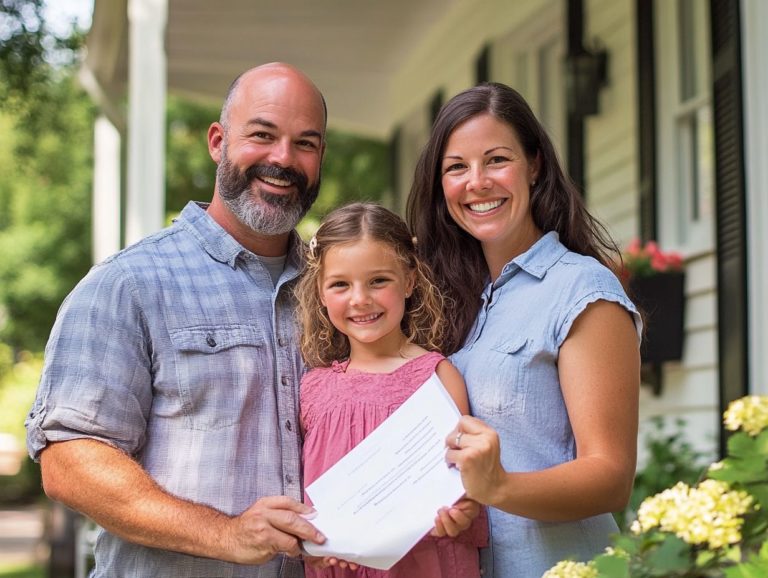5 Home Insurance Types You Didn’t Know About
As a homeowner, you likely understand the basics of home insurance, but there s an entire realm of specialized coverage options that may have escaped your notice.
From securing your prized possessions to shielding yourself against the financial repercussions of natural disasters, understanding the details of additional insurance types can be essential.
This article delves into five crucial home insurance types you might not have considered, highlighting their benefits, debunking common misconceptions, and guiding you on how to assess if they re a good fit for your needs.
More importantly, it addresses the risks of forgoing these coverages and provides insights on how to snag the best deals.
Get ready to protect your home!
Contents
- Key Takeaways:
- 1. Flood Insurance
- 2. Earthquake Insurance
- 3. Umbrella Insurance
- 4. Valuable Items Coverage
- 5. Identity Theft Insurance
- What Are the Benefits of Having These Additional Home Insurance Types?
- What Are the Potential Risks of Not Having These Types of Insurance?
- How Can a Homeowner Find the Best Deals on These Types of Insurance?
- Frequently Asked Questions
Key Takeaways:

Protect against unexpected disasters with flood and earthquake insurance.
Umbrella insurance offers additional liability coverage for peace of mind.
Valuable items and identity theft insurance can protect your assets and personal information.
Don t wait until it s too late!
1. Flood Insurance
Flood insurance is an essential part of a comprehensive homeowners insurance plan, crafted to shield your property from the devastating impacts of water damage due to flooding a peril that standard home insurance policies typically overlook. Understanding the details of flood insurance is crucial, particularly for homeowners in flood-prone areas, as it can significantly lessen financial losses and bring you peace of mind.
Unlike your typical homeowners insurance, which usually covers fire, theft, and other risks, flood insurance is specifically designed to tackle damage caused by rising water levels. This coverage encompasses a variety of scenarios, including flash floods, storm surges, and even mudslides triggered by excessive rainfall.
Flood insurance is important. It is a vital element of a strong risk management plan, providing protection against natural disasters that can lead to catastrophic financial consequences.
By incorporating this specialized coverage, you can safeguard your investments and secure a more stable financial future, particularly in regions where flooding frequently poses a threat.
2. Earthquake Insurance
Earthquake insurance serves as a vital safety net for homeowners residing in areas where earthquakes are common, offering crucial protection for damages that standard homeowners insurance often overlooks.
This specialized coverage ensures that both your residence and personal belongings are safeguarded against the unexpected and potentially devastating consequences of an earthquake, which can impose big financial challenges.
Understanding the details of earthquake insurance is essential; it typically encompasses dwelling coverage, which addresses structural damages, as well as personal property coverage that protects your belongings think furniture, electronics, and treasured items.
It’s equally important to be aware of potential coverage gaps; many homeowners may not realize that other policies could leave them inadequately protected. Getting earthquake insurance provides financial peace of mind and ensures that your investment is effectively shielded from nature’s unpredictable whims.
This enables you to rebuild and recover more efficiently after a seismic event.
3. Umbrella Insurance
Umbrella insurance serves as an essential safety net, providing you with an added layer of liability coverage that extends beyond the limits of standard homeowners insurance. This protection is invaluable, especially if you’re a homeowner with significant assets, as it safeguards your financial stability from major claims and lawsuits.
Picture this: An accident happens what will you do? A guest slips and falls on your property, or perhaps a dog bite leads to a lawsuit. In these instances, having that extra coverage can truly be a game-changer.
Umbrella insurance can address legal fees and settlements that exceed the basic liability limits of your homeowner policy, preventing you from being vulnerable to financial upheaval.
It’s vital for you to have a clear understanding of your coverage limits and any exclusions that might apply, ensuring you’re well-protected in various scenarios. For instance, if you own a trampoline or a swimming pool, you may need to consider additional measures to shield yourself from potential claims.
Choosing the right insurance can secure your home and your peace of mind. Don’t hesitate to explore unique offerings from home insurance providers today!
4. Valuable Items Coverage

Valuable items coverage is a specialized insurance option. It protects high-value personal belongings, like jewelry, art, and collectibles, which may not be fully covered under standard homeowners insurance.
Using insurance riders or scheduling items helps ensure your treasures are insured against theft, loss, or damage. This coverage is essential for safeguarding your investments.
Many homeowners underestimate the worth of their belongings. Engaging in a professional appraisal process is crucial to determine their accurate values.
This step sets the right coverage limits. It helps prevent underinsurance, which could lead to significant financial loss when filing a claim.
Choosing coverage tailored to your needs gives you peace of mind. You ll know that your valuable items are protected in unforeseen circumstances.
5. Identity Theft Insurance
Identity theft insurance protects you from the financial repercussions of identity theft. It covers costs associated with recovering your identity and restoring your credit.
As identity theft rises, having a dedicated policy can spare you considerable stress and financial setbacks. This type of coverage is often overlooked by standard homeowners insurance policies.
In today s digital world, personal information is frequently at risk due to data breaches and phishing scams. Understanding this insurance is essential.
Typically, identity theft insurance covers legal fees and lost wages. It also covers expenses incurred while recovering your identity.
This peace of mind is priceless as cybercrime becomes more rampant. You should also consider taking proactive measures.
For example, regularly monitor your financial statements, use strong, unique passwords, and enable two-factor authentication for enhanced security.
Combining identity theft insurance with these strategies establishes a strong defense against potential threats.
What Are the Benefits of Having These Additional Home Insurance Types?
Having additional types of home insurance, like flood, earthquake, and umbrella insurance, strengthens your property protection. To learn more about essential options, check out 5 types of coverage you might overlook. This shields you from unforeseen events and reduces financial burdens.
These extra policies fill coverage gaps in your standard homeowners insurance. For instance, understanding 5 tips for selecting home insurance types can also offer unique benefits like additional living expenses and potential discounts.
For example, flood insurance protects against water damage usually excluded in typical policies. This is especially important if you live in a high-risk area.
Similarly, earthquake insurance provides crucial protection against seismic events. It allows you to start recovery without crippling out-of-pocket expenses.
Umbrella insurance extends coverage beyond ordinary limits. It safeguards you against liability claims that could financially derail even secure households.
These policies create a robust safety net against overlooked risks. They work together to enhance your overall protection strategy.
Understanding how these policies function debunks common myths. It also reveals vital risks tied to opting for non-coverage.
This journey guides you toward securing beneficial insurance packages for peace of mind and financial security.
How Do These Types of Insurance Work?
It’s crucial to understand how different types of home insurance work. This knowledge helps you protect your property and investment.
Each specialized insurance type comes with its own coverage limits and exclusions. These factors can greatly influence your protection against specific risks.
For example, flood insurance typically covers damages caused by rising water levels. In contrast, standard homeowners’ policies often leave you exposed to this peril, especially during heavy rain seasons.
When it’s time to file a claim, the process can vary based on your insurance provider and the incident. You might need to gather documentation like photos and repair estimates.
This is where insurance add-ons become invaluable. They allow you to enhance your baseline coverage. For instance, by adding coverage for valuable items like art or jewelry, you ensure that your expensive personal effects are protected, significantly reducing your financial risk in unforeseen circumstances.
What Are the Common Misconceptions About These Types of Insurance?

There are several misconceptions surrounding home insurance types that you should know. A prevalent myth is that standard homeowners insurance covers all perils, including floods and earthquakes. This misconception can lead to dangerous coverage gaps.
Many people believe that standard policies cover all unexpected damages. However, that s simply not the case.
For example, you might assume your home insurance covers your valuable belongings, only to find out there are limits on personal property coverage. To understand the key benefits of home insurance, some people think liability coverage is enough, but they often overlook the need for additional protection like umbrella insurance.
Clarifying these misconceptions empowers you to take action now and protect what matters most!
How Can a Homeowner Determine If They Need These Types of Insurance?
Determining whether you need additional types of home insurance like flood or earthquake coverage requires careful assessment of several factors. Consider your geographical location, property value, and specific risks associated with potential perils.
By evaluating your unique situation and recognizing any coverage gaps, you can make informed decisions about which types of insurance are essential for robust property protection. Start with a thorough self-assessment checklist.
This checklist should guide you to consider local risks, such as historical flooding or seismic activity, that may necessitate specific coverage.
Next, evaluating your property s value is crucial. This will influence how much coverage you need to fully safeguard your investments. Accurately estimating rebuilding costs will help you determine the proper policy limits.
To adopt a comprehensive approach, consulting with insurance professionals is highly advisable. They can provide personalized advice tailored to your circumstances, helping you navigate the complexities of insurance and ensuring optimal protection for your home.
Don’t wait until it’s too late. Assess your insurance needs today to ensure you’re fully protected!
What Are the Potential Risks of Not Having These Types of Insurance?
Not having specialized home insurance like flood or earthquake coverage can expose you to major financial risks, especially in areas prone to these hazards. Recovery costs can exceed what standard homeowners insurance covers. This oversight can lead to severe financial consequences, so it s vital to understand the dangers of inadequate coverage.
Imagine living in a coastal area, confident that your standard policy will protect you from storm damage, only to discover after a disaster that flooding isn t included. This gap in coverage could mean thousands of dollars in out-of-pocket expenses for repairs, significantly impacting your savings and financial stability.
Liability exposure can become an issue during natural disasters. Injuries to visitors may not be covered, potentially resulting in lawsuits that can financially cripple an unprotected homeowner. Also, your personal belongings like family heirlooms or electronics might not be fully covered, leaving you to bear the losses you thought were insured.
Securing specialized insurance can truly make the difference between financial recovery and ruin.
How Can a Homeowner Find the Best Deals on These Types of Insurance?
Finding the best deals on home insurance requires thorough research. Compare quotes from various companies and look for discounts to secure comprehensive coverage at competitive rates.
By understanding the details of each policy and your options, you can make smart money choices while ensuring your property is well protected.
To maximize savings, consider bundling different types of insurance policies. This strategy simplifies managing your coverage and often leads to additional discounts.
Many insurers offer loyalty discounts that reward long-term clients, providing another opportunity for savings. Using online comparison tools can streamline your search for the best rates and keep you updated on market trends.
Engaging with knowledgeable insurance professionals is equally important. They can provide tailored advice based on your specific situation, helping you save money while choosing the right coverage for your needs.
Frequently Asked Questions

What Are the Different Types of Home Insurance Policies?
There are six main types of home insurance policies: conventional, condo, renters, mobile home, vacant home, and seasonal home insurance.
What Is Covered Under a Conventional Home Insurance Policy?
A conventional home insurance policy typically covers your home’s structure, personal belongings, liability protection, and additional living expenses in case of a covered loss.
What Is the Difference Between Condo and Renters Insurance?
Condo insurance covers the inside of your unit, while renters insurance covers only your personal belongings and liability.
What Does Mobile Home Insurance Cover?
Mobile home insurance covers your manufactured or modular home, along with any attached structures, personal belongings, and liability protection.
What Is Vacant Home Insurance?
Vacant home insurance provides coverage for properties that are unoccupied for an extended period, usually 30 to 60 days. This insurance protects you from vandalism, theft, and other damages.
What Is Seasonal Home Insurance?
Seasonal home insurance is designed for properties used only part of the year, such as vacation homes or cabins. It offers protection for the structure, personal belongings, and liability during the off-season.






